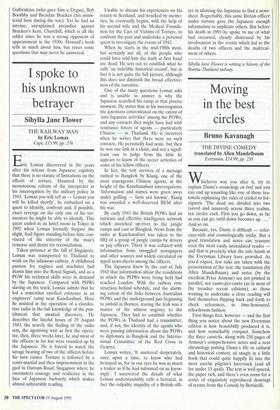I spoke to his unknown betrayer
Sibylla Jane Flower
THE RAILWAY MAN by Eric Lomax Cape, £15.99, pp. 276 Eric Lomax discovered in the years after his release from Japanese captivity that there is no statute of limitations on the effects of torture. Haunted by the monotonous refrain of the interpreter at his interrogation by the military police in 1943, 'Lomax you will tell us — Lomax you will be killed shortly', he embarked on a quest to identify, confront and, if possible, exact revenge on the only one of his tor- mentors he might be able to identify. This quest ended in an hotel room in Tokyo in 1992 when Lomax formally forgave the slight, frail figure standing before him, con- vinced of the sincerity of the man's remorse and desire for reconciliation.
Taken prisoner at the fall of Singapore, Lomax was transported to Thailand to work on the infamous railway. A childhood passion for engines and machines had drawn him into the Royal Signals, and as a POW his technical skills were in demand by the Japanese. Compared with POWs slaving on the track, Lomax admits that he led a somewhat rarefied existence in an engineers' camp near Kanchanburi. Here he assisted in the operation of a clandes- tine radio in the full knowledge of the pun- ishment that awaited discovery. He describes the fateful hours of 29 August 1943, the search, the finding of the radio sets, the agonising wait as first the opera- tor, then, three weeks later, he and most of the officers in his hut were rounded up by the Japanese. He is forced to watch the savage beating of two of the officers before his turn comes. Torture is followed by a court-martial and then imprisonment in the gaol in Outram Road, Singapore where he encounters courage and resilience in the face of Japanese barbarity which makes almost unbearable reading. Unable to discuss his experiences on his return to Scotland, and wracked by memo- ries, he eventually begins, with the help of his second wife and the Medical Founda- tion for the Care of Victims of Torture, to confront the past and undertake a personal quest to investigate the events of 1943.
When he starts in the mid-1980s most, but certainly not all, of the people who could have told him the truth at first hand are dead. He sets out to establish what he calls 'an indelible historical record', but in fact it is not quite the full picture, although this does not diminish the broad effective- ness of the narrative.
One of the many questions Lomax asks and is unable to answer is why the Japanese searched his camp at that precise moment. He states that at his interrogation the questions concentrated on the extent of 'anti-Japanese activities' among the POWs, and any contacts they might have had with resistance forces or agents — particularly Chinese — in Thailand. He is incorrect when he writes that there were no such contacts. He personally had none, but then he was one link in a chain, and not a signif- icant one to judge from the little he appears to know of the secret activities of some of his fellow officers.
In fact, the text survives of a message rushed to Bangkok by Kiang, one of the most courageous Chinese agents, at the height of the Kanchanaburi interrogations, 'Information and names were given away under grilling — facts not known'. Kiang was awarded a well-deserved BEM after the war.
By early 1943 the British POWs had an intricate and effective intelligence network which stretched up-river to the jungle camps and east to Bangkok. News from the radio at ICanchanaburi was taken to the HQ of a group of jungle camps by drivers or pay officers. There it was collated with information from smuggled newspapers and other sources and widely circulated on typed news-sheets among the officers.
The Japanese knew by the end of July 1943 that information about the conditions in which the POWs were being held had reached London. With the railway con- struction behind schedule, and the alarm- ing extent of the links between Australian POWs and the underground just beginning to unfold in Borneo, tracing the leak was a matter of the utmost urgency to the Japanese. They had to establish whether the POWs in Thailand had a transmitter, and, if not, the identity of the agents who were passing information about the POWs to diplomats in Bangkok and the Interna- tional Committee of the Red Cross in Geneva.
Lomax writes, 'It mattered desperately, once upon a time, to know who had betrayed us, for in our eyes he was as much a traitor as if he had informed on us know- ingly'. I uncovered the details of what Lomax understandably calls a betrayal, in fact the culpable stupidity of a British offi- cer in allowing the Japanese to find a news- sheet. Regrettably, this same British officer under torture gave the Japanese enough information to implicate others. But before his death in 1993 he spoke to me of what had occurred, clearly distressed by his involvement in the events which led to the deaths of two officers and the maltreat- ment of others.
Sibylla Jane Flower is writing a history of the Burma-Thailand railway.


















































 Previous page
Previous page